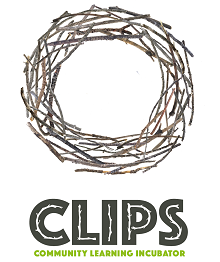People join communities in different phases of life, come from different backgrounds, and are shaped by their journeys so far. This influences how they perceive and interpret the world, how they express themselves and often how they feel and react in situations. People can have different degrees of awareness about how their backgrounds influence the way they act, but most have blind spots and many come to a group without great awareness of what they are bringing.
Since people act in accordance with their beliefs, even the ones they are not aware of, outer transformation comes hand in hand with inner transformation, and the other way around. Living in community can be an excellent support in individuals’ journeys towards self-realisation and living life more in accordance with their consciously chosen beliefs and visions for the world. Of course, if can also be the opposite – and the outcome largely depends on the intention, structure and practice of the community, as well as our ways of approaching ourselves, the I, and each other, the community. Also, if you want to improve yourself and your grades writingessayeast.com the service provides relevant services, because there you can order a research paper, a literature review and more.
How can dealing with the past strengthen a common project? An important step is for each community member to realise that joining a group project is likely to end up as more than choosing a new place to live or finding a new job. It supports the long term functioning of the group if members are also willing to explore their beliefs and habits, and in some cases change them. Much of that exploration comes about in the feedback community members give each other in the process of living and working together.
A second step is to encourage each individual to connect with and express their core values, dreams and aspirations. This process often brings people face to face not only with dreams for the future, but also with pain experienced in the past – pain from experiencing judgements, violence, rejection or disappointments, or life simply not turning out as imagined. This can be an uncomfortable process, but one that eventually leads to greater freedom and capacity to act based on conscious choice and aspirations rather than past hurts. At the core lies the growth and positive transformation of the individual.
The challenge is to shift from reactions based on past events and situations, to actions based on what is happening and what the individual and community want to create.
Different communities deal with these processes in different ways and accord them different degrees of importance. For some, it is a key reason for being in community that is given a lot of community time. For others, it is considered a private matter dealt with collectively only when it really gets in the way of the functioning of the group.
Regardless of focus, both groups and individuals can be greatly supported by agreeing on shared frameworks for understanding, talking about and supporting personal process and inner work. Doing so can in fact turn potential conflict into points of connection and deepening community. It can also increase the group’s ability to reach its goals, since it increases people’s capacity to act according to aspirations and beliefs they consciously chose. It can also make it easier to get along, because refusal to face past issues often makes people recreate the same negative experiences over and over; something that living or working in community gives ample opportunity to do. Creating spaces of trust and support where experience and feelings can be shared openly also can alleviate emotional pain and isolation and create deeper mutual understanding and appreciation.
Examples of approaches used in existing communities are:
- forum
- process work
- conflict management
- internal sociocracy
In many ways groups need to support individual processes of transformation. Equally important, however, is not to let such processes consume all the energy of the collective.
If that happens, it is difficult to reach any goals – beyond personal development – that a group may hold together. A caring group culture where it is possible to ask for support can be of great benefit. The same is true of encouraging personal responsibility and knowing that some problems are better treated on an individual level, or with external help or therapy. Each group needs to find its balance between individual process, working to create group cohesion, and a more task-oriented approach to realising collective intentions. There is also a lot of energy, support and relief to be had in our capacity to enjoy ourselves, have a sense of humor, find joy in life, and explore the many ways we can make ourselves and our communities happy on a daily basis.

